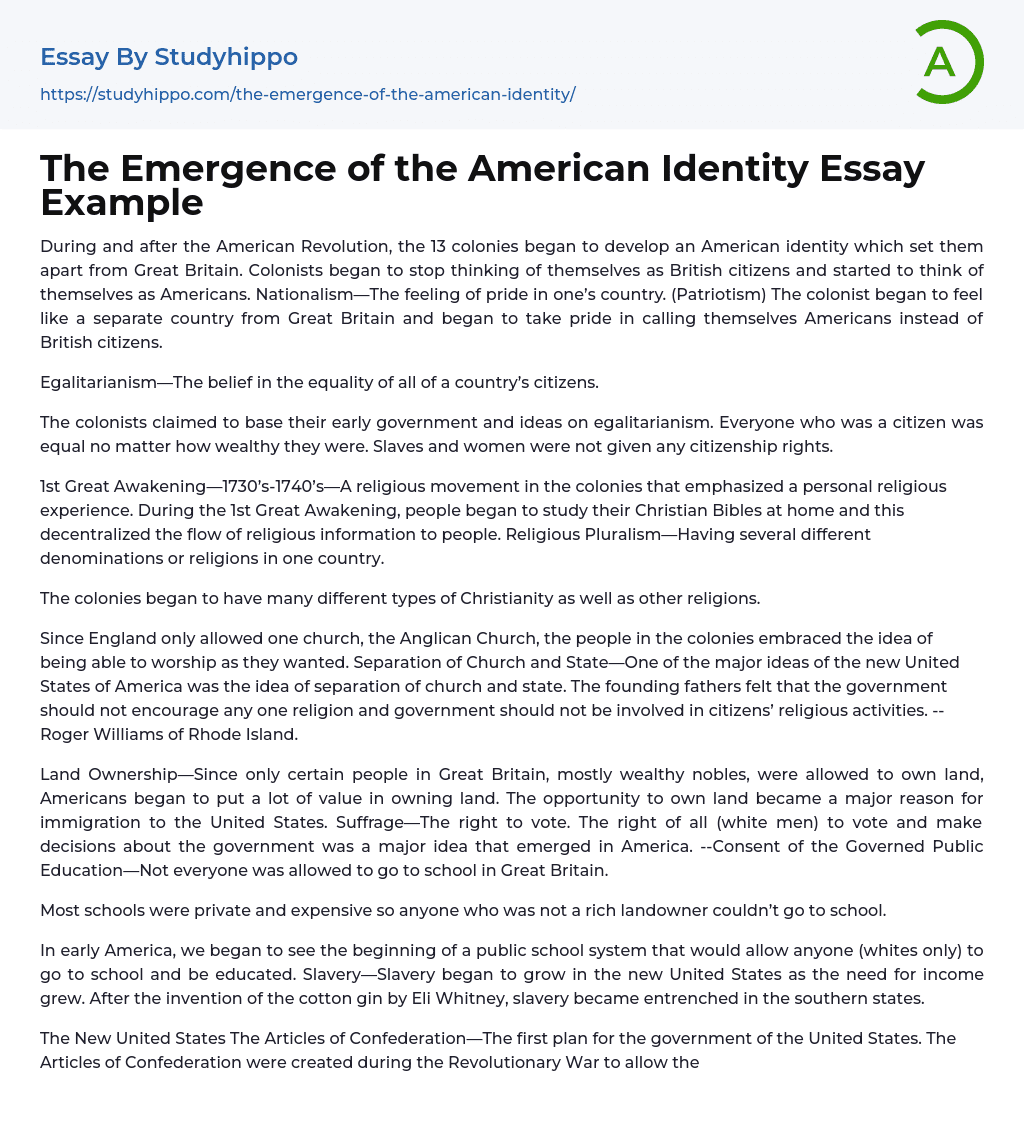During and after the American Revolution, the 13 colonies began to develop an American identity which set them apart from Great Britain. Colonists began to stop thinking of themselves as British citizens and started to think of themselves as Americans. Nationalism—The feeling of pride in one’s country. (Patriotism) The colonist began to feel like a separate country from Great Britain and began to take pride in calling themselves Americans instead of British citizens.
Egalitarianism—The belief in the equality of all of a country’s citizens.
The colonists claimed to base their early government and ideas on egalitarianism. Everyone who was a citizen was equal no matter how wealthy they were. Slaves and women were not given any citizenship rights.
1st Great Awakening—1730’s-1740’s—A religious movement in the colonies that emphasized a personal religious experience. During the
...1st Great Awakening, people began to study their Christian Bibles at home and this decentralized the flow of religious information to people. Religious Pluralism—Having several different denominations or religions in one country.
The colonies began to have many different types of Christianity as well as other religions.
Since England only allowed one church, the Anglican Church, the people in the colonies embraced the idea of being able to worship as they wanted. Separation of Church and State—One of the major ideas of the new United States of America was the idea of separation of church and state. The founding fathers felt that the government should not encourage any one religion and government should not be involved in citizens’ religious activities. --Roger Williams of Rhode Island.
Land Ownership—Since only certain people in Great Britain, mostly wealthy nobles, were allowed to ow
land, Americans began to put a lot of value in owning land. The opportunity to own land became a major reason for immigration to the United States. Suffrage—The right to vote. The right of all (white men) to vote and make decisions about the government was a major idea that emerged in America. --Consent of the Governed Public Education—Not everyone was allowed to go to school in Great Britain.
Most schools were private and expensive so anyone who was not a rich landowner couldn’t go to school.
In early America, we began to see the beginning of a public school system that would allow anyone (whites only) to go to school and be educated. Slavery—Slavery began to grow in the new United States as the need for income grew. After the invention of the cotton gin by Eli Whitney, slavery became entrenched in the southern states.
The New United States The Articles of Confederation—The first plan for the government of the United States. The Articles of Confederation were created during the Revolutionary War to allow the states to band together to fight the British.
The Articles had a very weak Central government and left most of the power with the State governments. The Articles had a Unicameral (One chamber) Congress where each state had one vote. The Articles of Confederation gave the federal government the following powers: 1.
Congress could declare war and make treaties. 2. Congress could create a postal service 3. Congress could borrow money 4. Congress could deal with Native Americans.
Weaknesses of the Articles of Confederation 1. Congress could not pass and collect taxes. 2. Congress could not regulate interstate trade.
.
Regardless of population, each state only had one vote. 4. A two-thirds majority was needed to pass laws. 5. A unanimous vote was needed to amend the Articles.
6. No executive branch. 7. No judicial branch.
8. 13 separate states with no unity. Land Ordinance of 1785—Congress established a plan for surveying and dividing the area west of the Appalachian Mountains and north of the Ohio River. Northwest Ordinance of 1787—Congress established a plan for dividing the new land into territories and a plan for how those territories could become new states.
Shays Rebellion—Daniel Shays, a Revolutionary War veteran, was a farmer in Massachusetts. He had a lot of debt because of very high taxes in MA. Shays was about to be put in debtors prison when he gathered over 1,000 farmers with the same problems and they tried to take over an arsenal. Massachusetts militia put down the first rebellion in the new United States. Shay’s Rebellion showed the weakness of the Articles of Confederation. The federal government had no power to act on the rebellion so the state militia (United States Military) had to step in.
- Abolitionism essays
- Adam Smith essays
- American History essays
- American Revolution essays
- Ancient Egypt essays
- Articles Of Confederation essays
- Atlantic Slave Trade essays
- Aztec essays
- Benjamin Franklin essays
- Civil Rights Act of 1964 essays
- Civil Rights Movement essays
- Civil war essays
- Cleopatra essays
- French And Indian War essays
- Gettysburg essays
- Great Depression essays
- Hurricane Katrina essays
- Industrial Revolution essays
- Jamestown essays
- Manifest Destiny essays
- Mccarthyism essays
- Patrick Henry essays
- Pearl Harbor essays
- Pocahontas essays
- Prohibition essays
- Pyramids essays
- Salem Witch Trials essays
- Slavery essays
- The New Deal essays
- Thirteen Colonies essays
- Westward Expansion essays
- Caste System essays
- Citizenship essays
- Civil Society essays
- Community essays
- Culture essays
- Deviance essays
- Discourse Community essays
- Female essays
- Filipino People essays
- Igbo People essays
- Indigenous Australians essays
- Indigenous Peoples essays
- Men essays
- Middle Class essays
- Minority Group essays
- Modern Society essays
- Popularity essays
- Social Control essays
- Social Institution essays




